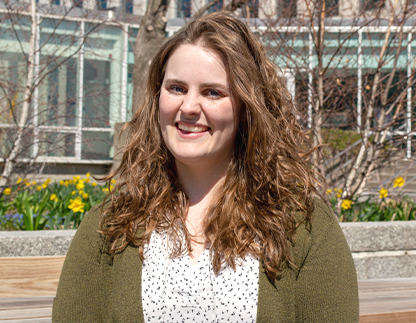I love the continuous discovery in science. When I am working in the lab I feel like a kid—constantly in awe of what is possible.”
Madison Bardot
PhD Candidate in the Department of Chemistry

Madison Bardot is a PhD candidate in the Department of Chemistry in the Weinberg College of Arts and Sciences. In her research, she works with a new class of materials to create strong and flexible chain mail-shaped polymers. She is a member of the Dichtel Research Group and was awarded a Ryan Fellowship in 2024.
How would you describe your research and/or work to a non-academic audience?
I make polymers that look like chain mail on the molecular level. These materials are a new class of polymers with inherent flexibility and strength. We are constantly finding new, unique properties and applications for these materials.
What have been some of the most memorable twists and turns of your career?
After my second year, my project was not working. My boss and I decided that I should pivot and we decided to make molecular chain mail. I thought about how to make this material for a few weeks but could not figure out how with the currently established methods. In a moment of frustration, I decided to take a break and look through recent research in crystal chemistry. I was shocked when I found a structure that was close to what we wanted to make. This was outside of typical methodology, but I thought 'why not try' and it actually worked!
What do you find both rewarding and challenging about your research and/or work?
We are working with an all-new class of materials. This means that we are still figuring out how to analyze and measure the properties of these materials. Some days, this is challenging since our polymers are so large and flexible, but when we do get the measurements it is exciting to see the unique properties of our materials.
Why Northwestern?
I chose Northwestern because this is the best place in the world to do the type of chemistry I work on. We have world-class diffraction, microscopy, and analysis facilities that help me do cutting-edge research.
How do you unwind after a long day?
After a long day, I like to hang out with my dogs and partner. My younger dog and I like to go on runs and then come inside and lay on the couch with my senior pup.
What inspires you?
I love the continuous discovery in science. When I am working in the lab I feel like a kid—constantly in awe of what is possible.
Tell us about a time when things did not go as planned. What did you learn?
The first two years of my PhD were devoted to a project that went nowhere. This was one of the biggest periods of growth for me. I learned that no matter how hard you work, sometimes the science just does not work. This experience helped me build resiliency and the skills that I have allowed me to excel in the latter part of my PhD.
What are you most proud of in your career to date?
My first first-authored research paper is the proudest moment of my career thus far. The paper, published in Science in January, was special for me because it is an idea that I came up with (and one that sounded crazy at the time), a project that I developed, and the culmination of two years of work across three different labs.
Publish Date: July 8, 2025
If you know a graduate student, postdoctoral scholar, graduate faculty member, staff member, or a member of our TGS alumni population who would make a great candidate for our TGS Spotlight Series, please complete this brief TGS Spotlight Series Nomination Form.